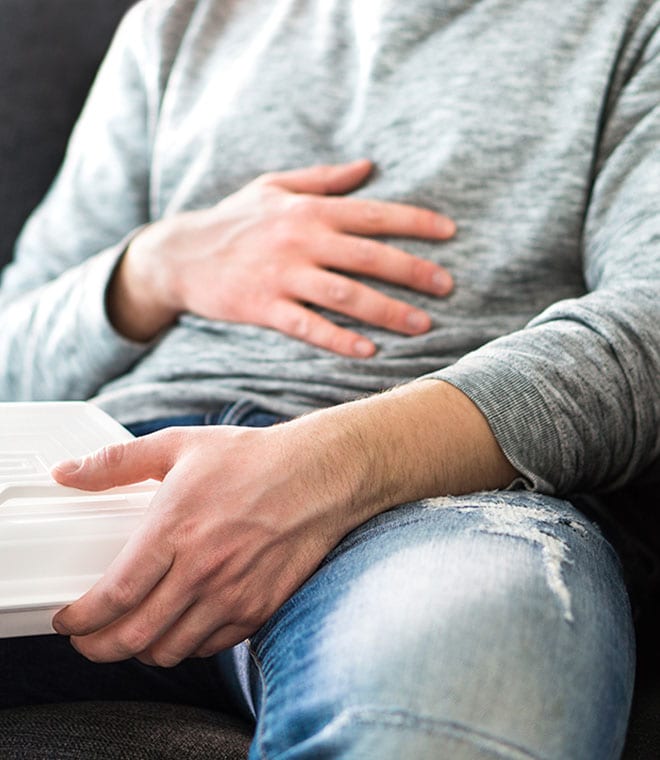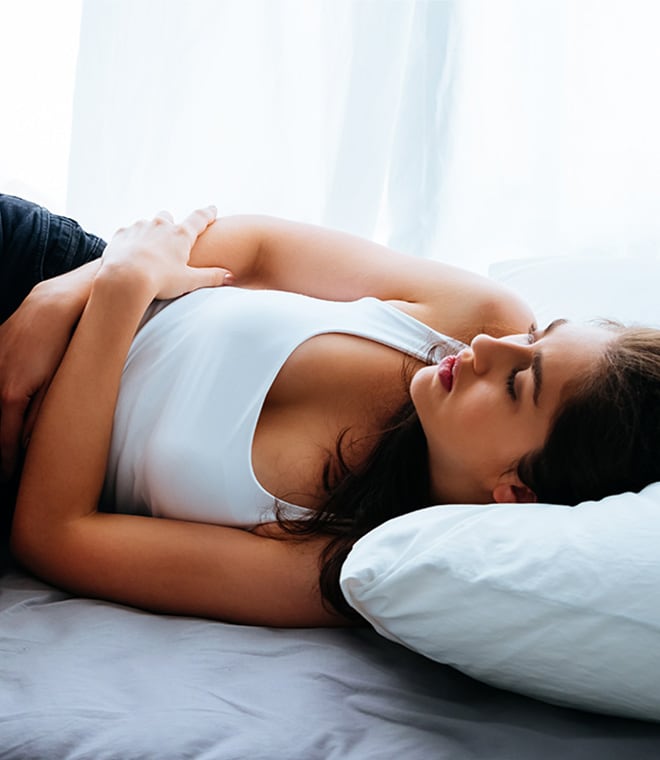Health
How to get rid of bloating
By Benjamin Renelus, MD, Gastroenterologist Sep 06, 2023 • 8 min
The tightness and pressure of a bloated stomach can be uncomfortable and may affect your appearance when accompanied by visible swelling. Fortunately, there are things you can do to alleviate bloating and reduce the risk of it occurring in the future.
Tips for bloating relief
The best approach for addressing bloating depends on the underlying cause. In healthy people, bloating occurs most often due to excess gas or constipation. Following these tips can help provide relief:
Make dietary changes
Modifying your diet can help reduce gas buildup. Some changes that you can make include:
- Avoid foods that cause gas, such as turnips, beans, lentils, cabbage and Brussels sprouts
- Cut back on or avoid carbonated beverages and the use of drinking straws
- Limit your intake of processed foods that contain artificial sweeteners and/or high levels of sodium
- Eat slowly and chew your food thoroughly
- Limit your portion size at meals
If you have IBS (irritable bowel syndrome) or SIBO (small intestinal bacterial overgrowth), your healthcare provider may recommend that you follow a low-FODMAP (fermentable oligosaccharides, disaccharides, monosaccharides and polyols) diet that includes cutting back on dairy products, wheat-based products, beans, lentils, and certain fruits and vegetables. A
low-FODMAP diet can reduce bloating and other symptoms of both IBS and SIBO.
Keep a food diary
Difficulty digesting certain foods can lead to bloating. Although there are foods that are common triggers, each person is different, so you’ll need to identify which ones are most likely to cause your bloating.
One way to pinpoint problem foods is to keep a food diary. Each day, write down exactly what you eat and drink and make notes about bloating and other digestive symptoms that you experience. Over time, you may begin to see patterns emerge, and then you can adjust your diet accordingly.
Stay hydrated
Drinking enough water and other fluids promotes regularity and may reduce hormone-related water retention. Most people need four to six cups of fluids per day, but it varies from person to person. Ask your healthcare provider how much you should consume daily.
Cut back on alcohol
Drinks containing alcohol can irritate your digestive tract and even cause diarrhea. Generally, women should have no more than one drink per day, while men should have no more than two daily drinks. To ease bloating, you may consider avoiding alcohol entirely.
Increase your physical activity
Exercise can aid in the digestive process and strengthen the walls of the abdomen to help food move through more efficiently. In addition, regular exercise can lessen water retention and assist with weight management.
Give probiotics a try
Probiotics are beneficial bacteria that may aid in digestion and help keep harmful bacteria in check. They’re found naturally in fermented foods like sauerkraut, tempeh, kimchi and yogurt, and also available in supplement form.
By boosting your levels of probiotics, you may promote overall digestive health. In some cases, healthcare providers prescribe targeted probiotics for the treatment of digestive issues, like SIBO, that cause bloating.
Address constipation
When constipation is the cause of bloating, increasing your intake of fiber by eating more whole grains, fruits and vegetables may help promote regularity. Fiber supplements may also be beneficial, especially for those who struggle to get enough dietary fiber through food alone.
Treatments for constipation, such as stool softeners and laxatives, may be beneficial for some people. Discuss treatment options with your healthcare provider to determine which is right for you.
Try gas relief products
Over-the-counter medications for gas relief may reduce bloating for some people. One such medication is simethicone, which may help resolve or move gas through your digestive system, although more research is needed to confirm effectiveness.
Charcoal caps are another option that may help, although more research is needed to confirm benefits. The porous surface of activated charcoal may capture gas molecules to ease bloating and other symptoms.
What causes bloating?
An estimated 10% to 25% of healthy people experience occasional bloating. Potential causes include:
Gas buildup
Your body naturally produces gas when you’re eating, and in excess, this gas can cause bloating. Some potential causes of excess gas include:
- Eating too quickly
- Drinking carbonated beverages
- Difficulty digesting carbohydrates, like the lactose in dairy products or the carbs in beans
- Small intestinal bacterial overgrowth (SIBO)
- Irritable bowel syndrome (IBS)
- Chronic indigestion (functional dyspepsia)
Contents of the digestive system
If the solids and liquids that remain after digestion take up too much space or become built up in the digestive tract, there may be less room for gas, and bloating may occur. Some potential causes of a buildup of digestive contents include:
- Constipation
- Bowel obstructions
- Digestive disorders that cause food to move through the GI tract more slowly
Hormones
As many as 75% of women report bloating before and during their periods, and bloating is often a symptom of perimenopause. In both cases, changes in estrogen levels are thought to contribute to gas and bloating. Female sex hormones are believed to potentially increase water retention and reduce the speed with which food travels through the digestive system, leading to bloating.
Other causes
Bloating can arise due to other causes, such as:
- Aerophagia: Swallowing air while eating and at other times can contribute to bloating.
- Recent weight gain: When you put on extra weight in the belly area, your abdominal volume may become reduced, leaving less room for digestive contents and an increased risk of bloating.
- Ascites: Fluid buildup in the abdominal cavity due to liver disease, heart failure or kidney failure can lead to bloating.
- Pancreatic insufficiency: If the pancreas doesn’t produce enough of the enzymes needed to break down food, bloating may occur.
- Inflammation: Infections, ulcers and drinking too much alcohol can cause inflammation of the stomach and/or intestines and contribute to bloating.
- Cancer: Less commonly, bloating can be a sign of colon, ovarian, pancreatic, uterine or stomach cancers.
Talk to your healthcare provider if problems persist
If lifestyle changes and over-the-counter remedies don’t fully relieve bloating, talk to your healthcare provider. They can order tests to rule out any underlying conditions that may be causing your symptoms. Also, let your healthcare provider know if bloating grows worse over time, continues for more than a week or is painful.
Published September 2023.
Sources:
- https://medlineplus.gov/ency/article/003123.htm
- https://www.cdc.gov/alcohol/fact-sheets/alcohol-use.htm
- https://my.clevelandclinic.org/health/symptoms/21740-bloated-stomach
- https://www.hopkinsmedicine.org/health/wellness-and-prevention/bloating-causes-and-prevention-tips
- https://familydoctor.org/condition/bloating/
- https://www.health.harvard.edu/diseases-and-conditions/taking-the-air-out-of-bloating
- https://health.clevelandclinic.org/feel-bloated-5-odd-reasons-stomach-pain/
- https://www.hopkinsmedicine.org/health/wellness-and-prevention/fodmap-diet-what-you-need-to-know
- https://my.clevelandclinic.org/health/diseases/21688-food-intolerance
- https://www.health.harvard.edu/staying-healthy/how-much-water-should-you-drink
- https://gi.org/topics/belching-bloating-and-flatulence/
- https://my.clevelandclinic.org/health/diseases/24311-chronic-diarrhea
- https://gi.org/topics/digestive-health-tips/
- https://www.health.harvard.edu/diseases-and-conditions/common-causes-of-constipation
- https://www.mayoclinichealthsystem.org/hometown-health/speaking-of-health/an-introduction-to-probiotics
- https://www.health.harvard.edu/diseases-and-conditions/dont-bomb-the-bowel-with-laxatives
- https://www.mayoclinic.org/diseases-conditions/gas-and-gas-pains/diagnosis-treatment/drc-20372714
- https://www.sleepfoundation.org/cpap/aerophagia




